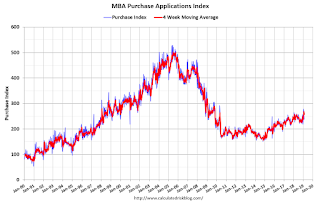Mortgage applications decreased 3.7 percent from one week earlier, according to data from the Mortgage Bankers Association’s (MBA) Weekly Mortgage Applications Survey for the week ending February 8, 2019.
... The Refinance Index decreased 0.1 percent from the previous week. The seasonally adjusted Purchase Index decreased 6 percent from one week earlier. The unadjusted Purchase Index decreased 6 percent compared with the previous week and was 5 percent lower than the same week one year ago.
...
“Application activity fell last week – even with rates decreasing – as renewed uncertainty about the domestic and global economy likely held potential homebuyers off the market,” said Joel Kan, MBA’s Associate Vice President of Industry Surveys and Forecasts. “Despite the recent decline in applications, we still expect that the continued strength of the job market and lower rates will support more purchase activity in the coming months.”
Added Kan, “The 30-year fixed-rate mortgage dropped to its lowest level since last March, and was 52 basis points lower than its recent high last November. Government refinances provided a bright spark, picking up over 10 percent, as both FHA and VA refinancing activity saw increases over the week.”
...
The average contract interest rate for 30-year fixed-rate mortgages with conforming loan balances ($484,350 or less) decreased to 4.65 percent from 4.69 percent, with points decreasing to 0.43 from 0.45 (including the origination fee) for 80 percent loan-to-value ratio (LTV) loans.
emphasis added
 Click on graph for larger image.
Click on graph for larger image.The first graph shows the refinance index since 1990.
Rates would have to fall further for a significant increase in refinance activity.
 The second graph shows the MBA mortgage purchase index
The second graph shows the MBA mortgage purchase indexAccording to the MBA, purchase activity is down 5% year-over-year.